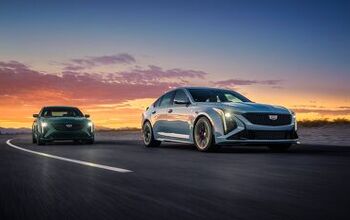U.K. Prepared to Ban Internal Combustion Engines by 2040

Britain will ban the sale of all new gasoline and diesel cars starting in 2040 as part of the government’s plan to reduce air pollution and copy France. The strategy, fronted by U.K. environment secretary Michael Gove and transport secretary Chris Grayling, would not only ban the future sale of internal combustion engines, but also provide a governmental incentive program similar to the United States’ Car Allowance Rebate System — colloquially known as “cash for clunkers.”
Because, as you know, nothing is better for the environment ( or the used car market) than populating scrapyards with fully functional automobiles and having factories across the globe expend extra energy to replace them.
“We can’t carry on with diesel and petrol cars,” Gove told British television audiences on Wednesday. “There is no alternative to embracing new technology.”
That’s doubly true, as the government was ordered in April to publish stringent new plans to tackle air pollution after the British high court rejected attempts by ministers to delay the policy until after the general election. Much of the U.K. believes it’s in the midst of a pollution crisis believed to be responsible for over 40,000 premature deaths every year.
However, pushing through legislation that makes EVs mandatory may be pointless. Manufacturers are already scaling down engine sizes and adopting hybridized powertrains to meet existing emissions guidelines. Volvo wants to make all of its vehicles hybrids or purely electric within a couple of years, Mercedes-Benz has begun widely adopting mild-hybrid systems, and practically every other automaker is investing heavily in battery development. The 2040 ban could be redundant by the time companies stand to face penalties.
That said, the 2040 deadline could be unrealistic if adoption progress more slowly. However, British demand for electrically powered vehicles grew a whopping 40 percent in 2015. While that only amounts to about 2.5 percent of the total market, it accounted for around 50,000 registrations in the final quarter of 2015. The number has nearly doubled by the first quarter of 2017 as EV market share closes in on 5 percent.
“Ending diesel and petrol car sales by 2040 is a step in the right direction but given that electric cars are coming anyway this is probably pretty irrelevant. It’s a bit like saying we’re banning the sale of steam engines by 2040,” said David Bailey, a professor of industrial strategy at the Aston Business School.
The real pinch of the plan will be felt by diesel drivers in the short term. From around 2020, specific jurisdictions will be able to levy extra charges on vehicles using the UK’s 81 most polluted routes if air quality fails to improve — and cars with the highest emissions will suffer the highest fines. According to The Guardian, the government wants taxes to be used as a last resort, fearing a backlash against any actions that punish motorists.
Other less stringent plans are afoot within the UK. The country hopes that by retrofitting buses, changing road layouts, and giving local governments agency in how to handle the pollution problem, it can increase air quality almost immediately.
For the United States, which has become less worried about automotive pollution in 2017, this means added pressure on domestic automakers hoping to sell a product globally. Diesel sales continue to trend downward and efforts exist in most developed nations to convince the public to adopt electric cars.
[Image: Ruben de Rijcke/ Wikimedia Commons ( CC BY-SA 3.0)]

A staunch consumer advocate tracking industry trends and regulation. Before joining TTAC, Matt spent a decade working for marketing and research firms based in NYC. Clients included several of the world’s largest automakers, global tire brands, and aftermarket part suppliers. Dissatisfied with the corporate world and resentful of having to wear suits everyday, he pivoted to writing about cars. Since then, that man has become an ardent supporter of the right-to-repair movement, been interviewed on the auto industry by national radio broadcasts, driven more rental cars than anyone ever should, participated in amateur rallying events, and received the requisite minimum training as sanctioned by the SCCA. Handy with a wrench, Matt grew up surrounded by Detroit auto workers and managed to get a pizza delivery job before he was legally eligible. He later found himself driving box trucks through Manhattan, guaranteeing future sympathy for actual truckers. He continues to conduct research pertaining to the automotive sector as an independent contractor and has since moved back to his native Michigan, closer to where the cars are born. A contrarian, Matt claims to prefer understeer — stating that front and all-wheel drive vehicles cater best to his driving style.
More by Matt Posky
Latest Car Reviews
Read moreLatest Product Reviews
Read moreRecent Comments
- Jeff Self driving cars are not ready for prime time.
- Lichtronamo Watch as the non-us based automakers shift more production to Mexico in the future.
- 28-Cars-Later " Electrek recently dug around in Tesla’s online parts catalog and found that the windshield costs a whopping $1,900 to replace.To be fair, that’s around what a Mercedes S-Class or Rivian windshield costs, but the Tesla’s glass is unique because of its shape. It’s also worth noting that most insurance plans have glass replacement options that can make the repair a low- or zero-cost issue. "Now I understand why my insurance is so high despite no claims for years and about 7,500 annual miles between three cars.
- AMcA My theory is that that when the Big 3 gave away the store to the UAW in the last contract, there was a side deal in which the UAW promised to go after the non-organized transplant plants. Even the UAW understands that if the wage differential gets too high it's gonna kill the golden goose.
- MKizzy Why else does range matter? Because in the EV advocate's dream scenario of a post-ICE future, the average multi-car household will find itself with more EVs in their garages and driveways than places to plug them in or the capacity to charge then all at once without significant electrical upgrades. Unless each vehicle has enough range to allow for multiple days without plugging in, fighting over charging access in multi-EV households will be right up there with finances for causes of domestic strife.


































Comments
Join the conversation
Brits are suffering from Euro-think, an especially damaging virus that can be economically fatal. And here I thought that "Brexit" was going to be the cure! Now I see they have succumbed to Frenchitis... Good God, man, how are we to hear the gusto of a roaring engine in the morning?! When the racing MC announces, "Gentlemen, start your engines!", are we to hear the whine of pathetic E- motors, who, like the littlest piggy, will go "wee, wee, wee" all the way home? ==================
"You also have no clue where they stand on climate matters. Indeed, part of the Syria refugee crisis is due to climate change, if you knew anything about what you spew about. You are a piece of work." Yes, I am sure the region awash in oil is VERY concerned over Global Warming. What's the official ISIS stance on Global Warming? Maybe somewhere in their policy paper between enslaving and raping Yazidi women and chopping off heads of infidels. And yes, barbarians are chopping off heads, raping women and killing children because Global Warming. Global Warming, what CAN'T it do!